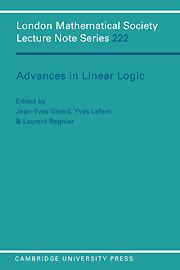Linear Logic: its syntax and semantics
Published online by Cambridge University Press: 17 February 2010
Summary
THE SYNTAX OF LINEAR LOGIC
The connectives of linear logic
Linear logic is not an alternative logic ; it should rather be seen as an extension of usual logic. Since there is no hope to modify the extant classical or intuitionistic connectives, linear logic introduces new connectives.
Exponentials : actions vs situations
Classical and intuitionistic logics deal with stable truths:
if A and A ⇒ B, then B, but A still holds.
This is perfect in mathematics, but wrong in real life, since real implication is causal. A causal implication cannot be iterated since the conditions are modified after its use ; this process of modification of the premises (conditions) is known in physics as reaction. For instance, if A is to spend $1 on a pack of cigarettes and B is to get them, you lose $1 in this process, and you cannot do it a second time. The reaction here was that $1 went out of your pocket. The first objection to that view is that there are in mathematics, in real life, cases where reaction does not exist or can be neglected : think of a lemma which is forever true, or of a Mr. Soros, who has almost an infinite amount of dollars. Such cases are situations in the sense of stable truths. Our logical refinements should not prevent us to cope with situations, and there will be a specific kind of connectives (exponentials, “!” and “?”) which shall express the iterability of an action, i.e. the absence of any reaction ; typically!A means to spend as many dollars as one needs.
- Type
- Chapter
- Information
- Advances in Linear Logic , pp. 1 - 42Publisher: Cambridge University PressPrint publication year: 1995
- 84
- Cited by

